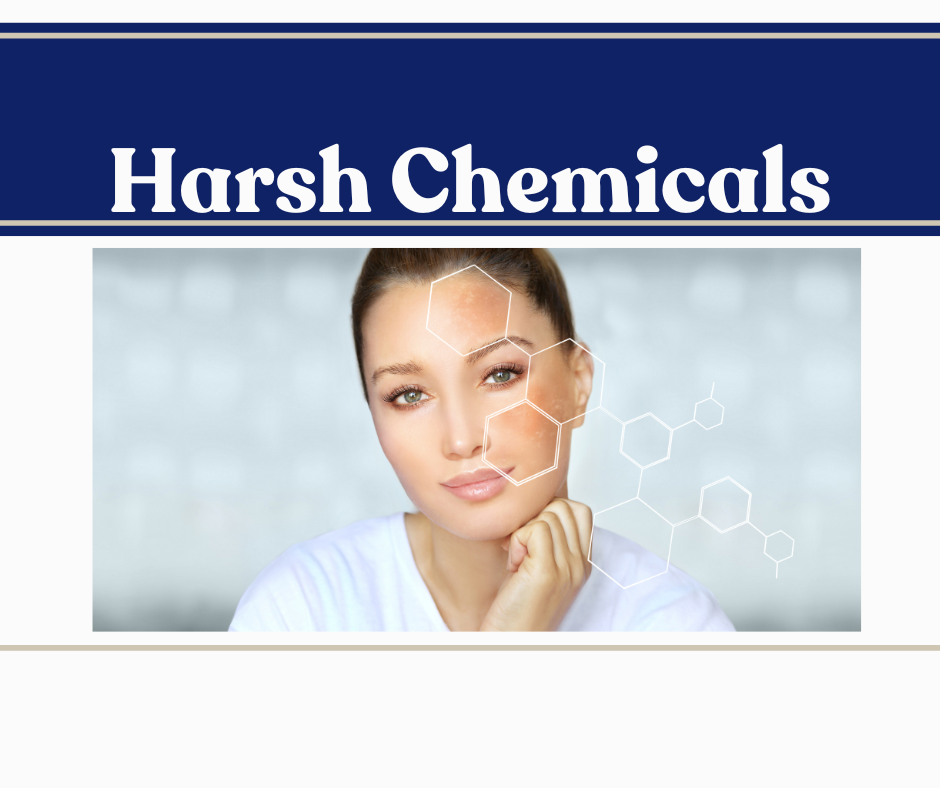
The Impact of Some Synthetic and Chemically Derived Ingredients on the Skin
Introduction
Skincare products are meant to nourish and improve the skin, but products with harsh chemicals or drying ingredients can often do more harm than good. Understanding how these ingredients impact the skin, especially the outermost layer called the epidermis, is crucial for maintaining healthy skin.
The Role of the Epidermis
Overview of the Epidermis
- Barrier Function: The primary role of the epidermis is to act as a barrier, protecting the deeper layers of skin from environmental damage, pathogens, and moisture loss.
- Composition: It is made up of keratinocytes, which produce keratin, a protein that gives skin its strength and resilience.
How Some Chemicals Damage the Skin
Common Harsh Chemicals
- Alcohols: they can strip the skin of its natural oils, leading to dryness and irritation.
 - Sulfates: They can be harsh on the skin, causing dryness and irritation.
- Sulfates: They can be harsh on the skin, causing dryness and irritation.
- Fragrances: Both synthetic and natural fragrances can be irritating.
- Parabens/ Phthalates: Concerns have been raised about their potential endocrine-disrupting effects.
-Mineral Oil/Petroleum: These can clog pores and prevent the skin from breathing.
- Silicones: These can trap dirt, bacteria, and sebum in the skin.
Effects on the Epidermis
Stripping Natural Oils
- Dehydration: Harsh chemicals strip the skin of its natural oils, leading to dehydration.
- Compromised Barrier: Without these natural oils, the skin barrier is weakened, making it more susceptible to damage and environmental stressors.

Irritation and Sensitization
- Inflammation: Exposure to chemicals like sulfates and alcohols can cause irritation and inflammation.
- Allergic Reactions: Fragrances and preservatives can lead to allergic reactions, resulting in redness, itching, and discomfort.
pH Imbalance
- Disrupted pH: The skin's natural pH is slightly acidic, which helps to protect against bacteria and fungi. Harsh chemicals can disrupt this balance, leading to increased vulnerability to infections.
Effects on the Epidermis
Moisture Loss
- Transepidermal Water Loss (TEWL): Drying ingredients can increase TEWL, where moisture evaporates from the skin, leading to dryness and flakiness.
Barrier Disruption
- Cracked and Broken Skin: Severe dryness can cause the skin to crack and peel, compromising the integrity of the epidermal barrier.

Sensitivity and Redness
- Increased Sensitivity: Drying ingredients can make the skin more sensitive and prone to redness and irritation.
Long-term Consequences
Chronic Inflammation
- Persistent Irritation: Continuous use of harsh or drying products can lead to chronic inflammation, which may accelerate the aging process and lead to conditions like dermatitis.
Weakening of the Skin Barrier
- Increased Vulnerability: A compromised barrier allows for easier penetration of pollutants and allergens, leading to further skin issues.
Altered Skin Texture
- Roughness and Uneven Tone: Long-term damage can result in a rougher skin texture and uneven skin tone, making the skin look less radiant and healthy.
Strategies for Protecting the Skin
Choosing the Right Products
- Gentle Cleansers: Opt for sulfate-free and alcohol-free cleansers.
- Fragrance-Free Options: Choose products that are free of synthetic fragrances and known irritants.
Hydration and Moisture
- Moisturizers: Use moisturizers with ingredients like natural carrier oils, hyaluronic acid and glycerin to help maintain skin hydration.
- Barrier Repair: Look for products that support and repair the skin barrier.
Patch Testing
- Patch Test: Always do a patch test with new products to check for any adverse reactions.
Balanced Skincare Routine
- Moderation: If you have to use active ingredients like benzoyl peroxide, salicylic acid, and retinoids then ensure it is done in moderation and follow with hydrating, nutrient-dense and soothing natural products.

Conclusion
Harsh and drying ingredients in skincare products can lead to significant damage to the epidermis, disrupting the skin's barrier function and causing dryness, irritation, and long-term issues. By choosing natural, nutrient-dense and gentle products and balancing the use of active ingredients, you can maintain healthy, resilient skin.

